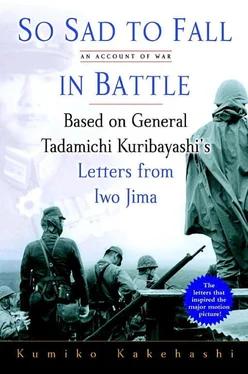Holding them in my own hands, I read the forty-one letters that Kuribayashi sent home. Lofty terminology—words like “Emperor,” “National Polity,” “Sacred War,” “Noble Cause”—was nowhere to be seen. Instead, there were footwarmers and hot-water bottles, stomach bands and camel hair undershirts, and boxes of shoes shut away in the guest room.
Kuribayashi thought hard about every detail of the domestic life of his family, and the same temperament was at work on Iwo Jima, where he carefully inspected the topography, made a daily tour of the defenses, and checked what and how much the soldiers were getting to eat.
There were stories that the commander in chief would often inspect the First Defense Line on his own. One day, when the members of the trench mortar company were all busily constructing their positions, Kuribayashi came to Mount Higashi by himself with his wooden cane.
The order was hastily given for them to fall in and stand at attention, but Kuribayashi told them to stay as they were. He asked how things were, went into the tin-roof barracks where they were in the middle of cooking, and carefully inspected the state of their supplies. Then he thanked them and went back to the headquarters. The bill of fare at the time was soft rice with powdered soy sauce, and clear soup with one or two bits of dried pumpkin in it. [3] Murai Yasuhiko, “My Memories of Iwo Jima,” Kaigyô magazine, July 1988.
Kuribayashi planned a fight that was based not on empty ideals, but on deep knowledge of how people lived. [4] So boundless was the reverence that Fleet Admiral Yamamoto Isoroku had for the imperial family that he is supposed to have asked his subordinates about the weather in Tokyo every morning, even when on the front lines at Truk or Rabaul in the Pacific. He was terrified that the Imperial Palace might be damaged by air raids.
Kuribayashi was also anxious about air raids on Tokyo, and they form a persistent theme in his letters. In Kuribayashi’s case, he was tormented by the image of his wife and children desperately trying to escape from a sea of fire. On September 12, 1944, he wrote to Yoshii:
As usual we’re getting air raids every day. These days it’s usually one or two planes in the night, and about twenty in the daytime. Our airstrips and our defense positions are damaged every time. As far as the eye can see, trees and plants are wiped out, and the ground is all turned over—a pitiable scene. People on the mainland cannot imagine what it’s like….
When I imagine what Tokyo would look like if it were bombed—I see a burned-out desert with dead bodies lying everywhere—I’m desperate to stop them carrying out air raids on Tokyo.
And on December 8, 1944:
In this war, there’s nothing we can do about soldiers like me out here on the front line dying. But I can’t stand the idea that even you, women and children on the mainland, have to feel that your lives are in danger. No matter what, take refuge in the country and stay alive.
Whenever there were air raids, he worried whether his family had gotten through safely without him to take care of them as head of the family. He seems to have been particularly concerned about Yoshii, who was not that tough physically. On September 27, 1944, he wrote to his son, Tarô, and his eldest daughter, Yôko, urging them to look after their mother during air raids.
You must understand that when there is an air raid the most important thing for you to do is to stop whatever you’re doing, get together at the house, and do your utmost to protect your mother by any and every means.
Even if the school has some rule about what you should do, you need to think that our house could be burned down or you might die, and you’ll see there’s no reason for you to blindly obey any school rules. Just imagine that you go out to protect the school (though in reality there’s every chance that either you couldn’t get there or else you couldn’t make it back), leaving your mother alone in the house. How can she take care of herself when she’s by herself? None of us can guarantee that something awful mightn’t happen to Mother if she’s all alone.
Yoshii was adored by her husband; only once did she cross out any of the text of a letter he sent her. The passage occurs at the end of a letter dated January 21, 1945: seven lines of Kuribayashi’s pencil-written text are blocked out with a black pen.
Tarô, the eldest child, deciphered the original text beneath the black ink and copied it at the time. Even now, with a little concentration, you can just about make out what it says.
The lines that Yoshii crossed out read as follows:
One more thing. In an earlier letter talking about cemeteries, I mentioned Gôtokuji Temple among others. That was because at the time it seemed likely we would settle in Tokyo, but now anywhere will do.
There’s every chance that my remains [will] be sent back to you, so we can postpone the whole cemetery issue. If I have a soul, it will stay near you and the children, so enshrining me in the house that you’re living in will be fine. (And then there’s always Yasukuni Shrine.)
Last of all, take good care of yourself and live a long life. I am most grateful to you for being a devoted wife to me for so long.
“I suppose the topic of his grave was just too painful for my mother,” Tarô commented.
As mentioned earlier, Kuribayashi had said in previous letters things like: “Don’t worry about what happens to me” (August 25, 1944), and “As I keep saying, screw up your courage so you can deal with whatever happens to me” (August 31, 1944). Maybe it was the detail with which he wrote to her that made Yoshii lose her calm.
Looking at the original letter, I noticed that there was another section, five lines earlier, where several characters at the beginning of a sentence had been crossed out. Holding the writing paper up to the light, I saw these words under the black ink: “As regards a final message, I have already written to you in detail about all the things you should do after my death, so, no matter what happens, do not be shocked or confused. I need you to be really strong.”
This was the first time that Kuribayashi used the term “final message” in one of his letters. The phrase made his wife realize that the many letters he had sent her previously had been composed as “final messages”—written with the expectation of imminent death.
The Americans launched their assault on Iwo Jima twenty-nine days after he wrote that letter.
CHAPTER SIX
THE AMERICAN INVASION
—
LIEUTENANT GENERAL HOLLAND M. SMITH OF THE U.S. MARINES, the commander in charge of the assault on Iwo Jima, likened the defenses Kuribayashi had constructed on the island to a worm. This, ironically, was the highest compliment he ever paid anyone in the forty years he spent leading men in the front lines of combat. He wrote, in Coral and Brass:
Like the worm which becomes stronger the more you cut it up, Iwo Jima thrived on our bombardment. The airfields were kept inactive by our attacks and some installations were destroyed, but the main body of defenses not only remained practically intact but strengthened markedly.
Smith may have been sixty-two years old and a diabetic, but he was handpicked for the job by President Franklin Roosevelt and sent off to the Pacific. A military man who had worked his way to the top, he was nicknamed “Howlin’ Mad Smith.”
Every force he led won.
They took large casualties on their way to victory, but Smith himself never shrank from danger. He hated military men who played politics and set little store by the lives of the men under their command, and he had no hesitations about airing his grievances to Admiral Chester W. Nimitz, commander in chief of the Pacific Fleet.
Читать дальше












